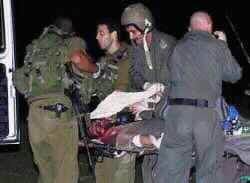Israel took control of the entire West Bank city of Hebron in the first of what seems to be an endless series of measures intended to crack down on Palestinian resistance activists this time after a shooting attack that killed 12 Israelis. Israel decided on a military response to Friday's ambush in Hebron although tensions over the attack and any retaliation threaten to set off a new round of violence despite U.S. calls for restraint ahead of possible military action in Iraq.
"We cannot let this go without responding," security sources quoted Defense Minister Shaul Mofaz as telling Secretary of State Colin Powell Saturday.
In the southern Gaza Strip, Israeli helicopter gunships fired missiles Sunday into a metal workshop, which the occupation army alleges was used by Palestinian resistance activists to make weapons.
Witnesses said six missiles slammed into the workshop in Khan Younis, setting it ablaze. They said no one was hurt in the attack, the second on the workshop in the last three months.
The occupation army said the workshop was used to make weapons such as rockets and mortar shells for use in a Palestinian uprising for independence in the West Bank and Gaza.
The Gaza military strike followed hours after Israel retook control of the whole West Bank city of Hebron, sending armored vehicles and troops into Palestinian parts of the city from which the occupation army had earlier withdrawn.
In the first stage of what was expected to be an extensive military operation in Hebron, armored vehicles poured into the West Bank city Saturday evening, backing up occupation troops who commandeered homes and buildings at strategic sites.
About 40 Palestinians, including the relatives of the three Palestinian resistance men killed in the gunbattle that followed the ambush, were rounded up earlier in the day.
The Friday shooting of Jewish settlers and their security escort as they walked home to the settlement of Kiryat Arba after Sabbath prayers was the deadliest in Hebron since the start of a two-year-old Palestinian uprising for statehood.
At the end of a week in which 17 Israelis and 12 Palestinians were killed in intifadha confrontations, including young children on each side, Prime Minister Ariel Sharon was under pressure to respond with an iron fist.
Additional measures were also agreed on, occupation army sources said but gave no details.
Calls for Israel to remain permanently in all of Hebron, a predominantly Palestinian city, came from several ministers. Others demanded Israel eliminate the Palestinian Authority.
"The job of the Israeli occupation army is to avenge this blood," right-wing lawmaker Beni Alon told a settler vigil in Hebron on Saturday night.
Some of the pressure stemmed from the need of ultra-nationalists in the caretaker government to win support from their settler constituency ahead of a January 28 election.
Powell called the attack "shocking and reprehensible."
The Islamic Jihad group claimed responsibility for the attack, saying it was payback for Israel's killing of one of its military leaders a week ago.
INTERNATIONAL CALLS FOR RESTRAINT
The U.N. High Commissioner for Human Rights, Sergio Vieira de Mello, condemned the attack but urged Israel to respond "in a measured manner in accordance with international law."
French Foreign Minister Dominique de Villepin cautioned Sharon against "massive retaliation which plays into the hands of those who committed these terrible attacks."
Palestinian cabinet minister Saeb Erekat urged the international community to complete a peace plan and added: "More Israeli incursions, more Israeli attacks, more Israeli bombardments will only be adding fuel to the fire."
The YESHA settlers' council, however, urged the government to restore Israeli security control in Hebron and disarm Palestinian President Yasser Arafat's Palestinian Authority and resistance groups.
The 450 Jewish settlers in Hebron live in heavily guarded enclaves alongside about 130,000 Palestinians and are considered among the most extreme in the West Bank.
The Israeli occupation army commander in Hebron said Saturday that possible reprisals by ultra-nationalist Jews was a "huge problem" that his brigade would do its utmost to prevent.
Settlers living illegally on occupied land have been frequent targets during the uprising in which at least 1,663 Palestinians and 639 Israelis have been killed since September 2000.
PHOTO CAPTION
An injured Israel settler is taken to an ambulance at a hospital in Jerusalem, November 15, 2002. Palestinian resistance men fired at Jewish settlers on their way to Sabbath eve prayers in the West Bank city of Hebron on Friday, killing at least 9 Israeli occupation army soldiers and 3 settlers and wounding 15 others, Israeli occupation army sources said. Photo by Flash 90/Reute
- Author:
& News Agencies - Section:
WORLD HEADLINES


 Home
Home Discover Islam
Discover Islam Quran Recitations
Quran Recitations Lectures
Lectures
 Fatwa
Fatwa Articles
Articles Fiqh
Fiqh E-Books
E-Books Boys & Girls
Boys & Girls  Women
Women










